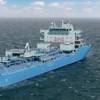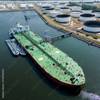ECSA Welcomes Outcome of MEPC 73
European Community Shipowners' Association (ECSA) welcomes the good progress that has been made at last week’s meeting of the Marine Environment Protection Committee (MEPC) on some key environmental issues.
Major developments were the adoption of the ban from 1 March 2020 on carriage of non-compliant fuel and the compromise reached on collecting data from the world fleet on fuel oil non-availability and quality without any delay in the implementation of the 2020 sulphur rules.
A fixed implementation date is retained, which is important in order to give governments the possibility to ensure a level playing field, while at the same time the safety concerns are being addressed. “There are still a number of safety issues to be tackled” says Martin Dorsman “and they will be addressed by IMO, both at the next MEPC and by the Maritime Safety Committee in December 2018”.
“In addition we welcome the guidelines on implementation of the global 0.5% sulphur in fuel cap, which takes effects on 1 January 2020, including a template for implementation planning as requested by the industry” says Martin Dorsman.
IMO asked for proposals to be submitted now to establish some necessary additions to the Global Integrated Shipping Information system (GISIS) to incorporate data from the experience ships gain on fuel oil availability and fuel quality.
Last week IMO also continued working towards implementing the ambitious GHG reduction strategy agreed in April 2018, by adopting an Action Plan for the development of short term measures that will deliver additional CO2 reductions before 2023 plus longer term measures that will eventually achieve full decarbonisation of international shipping.
With the Action Plan agreed by IMO last week, the way is now clear to make detailed proposals for specific CO2 reduction measures at the next MEPC in May 2019. The shipping industry intends to come forward with detailed ideas, potentially including new and innovative measures for long term CO2 reduction and the development of zero CO2 fuels.














